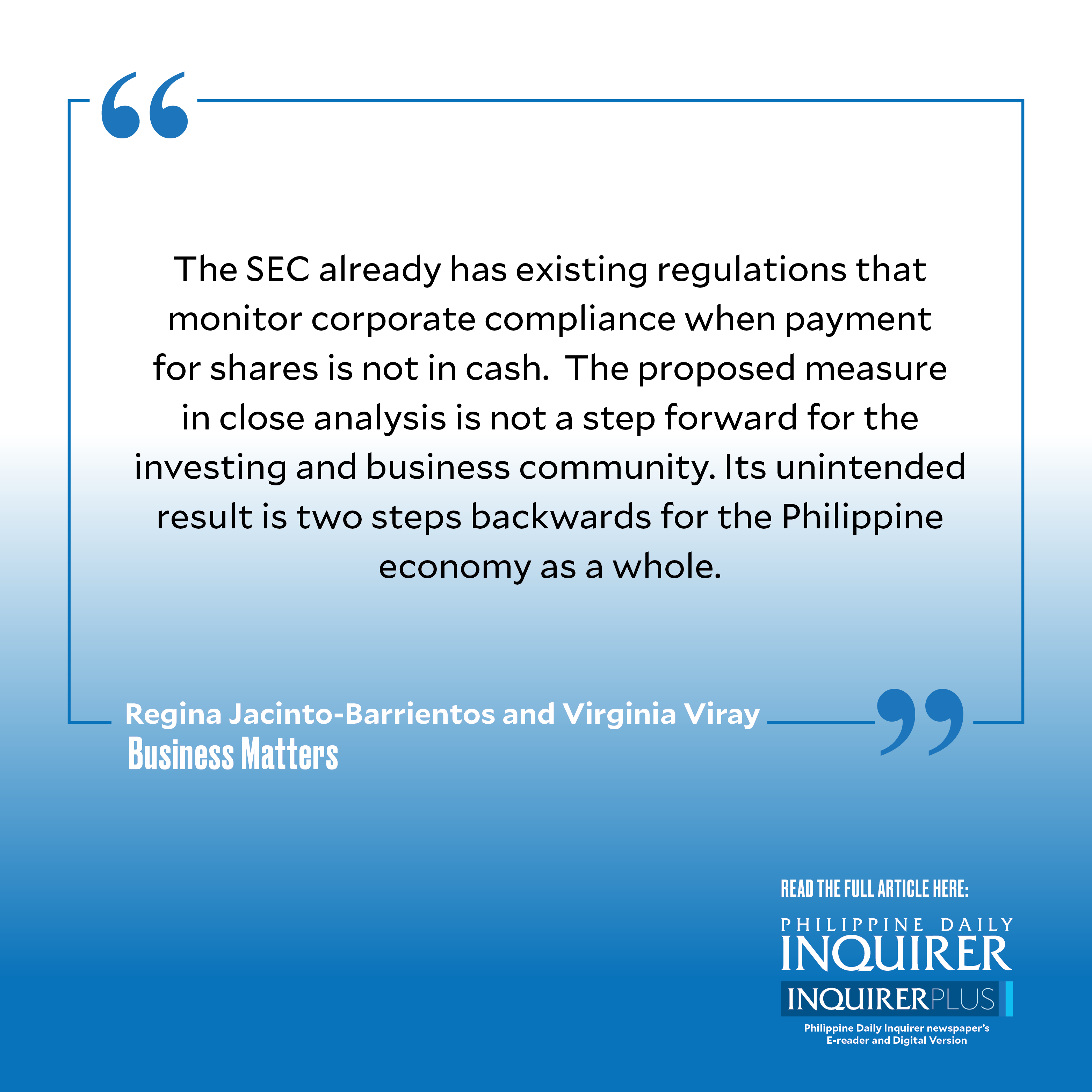A sky-is-the-limit investment destination
Last month, the Securities and Exchange Commission (SEC) released the initial draft of its guidelines on the creation or increase of additional paid-in capital (Apic). Intended to prevent the issuance of watered stock, the guidelines require corporations to submit documents, pay additional fees, and obtain SEC approval as a prerequisite to the creation of Apic. Their unfortunate result, however, is to keep corporations “stuck” in regulatory limbo for months at higher costs before they are permitted to proceed with business, which carries significant implications for a developing economy.
First, a closer look at the rules highlights a disjunction between their purpose and means—there is no risk of stock watering when subscriptions are paid at a premium or when additional capital is infused without the issuance of additional shares.
Article continues after this advertisementOn one hand, “watered stock” refers to stock acquired below par value. On the other hand, “Apic” refers to any amount paid above the par value of the shares. When shares are issued for more than they are worth, the additional value received by the corporation effectively increases its assets instead of impairing its capital. Apic enhances funds held in trust for the public and creditors. So how can stock be “watered down” when the subscription price is above par?
Second, requiring SEC consent to issue shares at a premium does away with the freedom of enterprise. Consider, a corporation whose business has been made profitable by the efforts of current investors and management, and whose fair market value has increased as a result. If the corporation seeks to issue shares to new shareholders, it would be unfair for original investors to allow new investors to come in only at par value. This would also deny it the opportunity to translate its goodwill to tangible value or force it to do so under significant filing fees. On top of documentary requirements preparation, the estimated six months processing time puts the transaction to risk.
Third, the financial roadblocks in the guidelines seem to contradict domestic and regional business practices of imposing minimal fixed fees for incorporation and issuance of shares.
Article continues after this advertisementA foreign investor that invests $200,000 in the Philippines (authorized capital stock, subscribed and paid-in) would pay almost P22,000 in SEC fees to incorporate. In contrast, Singapore’s Accounting and Corporate Regulatory Authority only charges 300 Singapore dollars for company registration (approximately P13,000). Suruhanjaya Syarikat Malaysia similarly charges only a fixed fee of 1,000 Malaysian ringgit for incorporation (approximately P12,000).
Looking at past incorporation numbers and figures, in the Asean region, additional capital is irrelevant in determining the regulator’s fees. The same, however, cannot be said for the Philippines, where Apic worth P20,000,000 would warrant an additional fee of P40,000, and Apic worth P200,000,000 would cost an additional P400,000.
The proposed measure in close analysis is not a step forward for the investing and business community. Heavier charges imposed by the SEC as opposed to its Asean counterparts raise barriers to entry and expansion that discourage foreign investment. Its unintended result is two steps backwards for the Philippine economy. The SEC has been forward thinking in many initiatives. We hope they will reconsider this matter so the Philippines will be an investment destination where the sky is the limit, instead of where the ceiling is set.
The SEC already has existing regulations that monitor corporate compliance when payment for shares is not in cash. The proposed measure in close analysis is not a step forward for the investing and business community. Its unintended result is two steps backwards for the Philippine economy as a whole.
—————-
Regina Jacinto-Barrientos is founding partner and CEO of PJS Law. With her 28 years in corporate mergers and acquisitions practice, she is an advocate of the Philippines competing on the global stage. Virginia Viray is senior partner at PJS Law. As a leading tax, corporate, and mergers and acquisitions practitioner, she is highly sought after by local and foreign investors for her solutions-driven approach. She is also a tax professor at the University of the Philippines College of Law.
—————-
Business Matters is a project of the Makati Business Club (makatibusinessclub@mbc.com.ph).

















